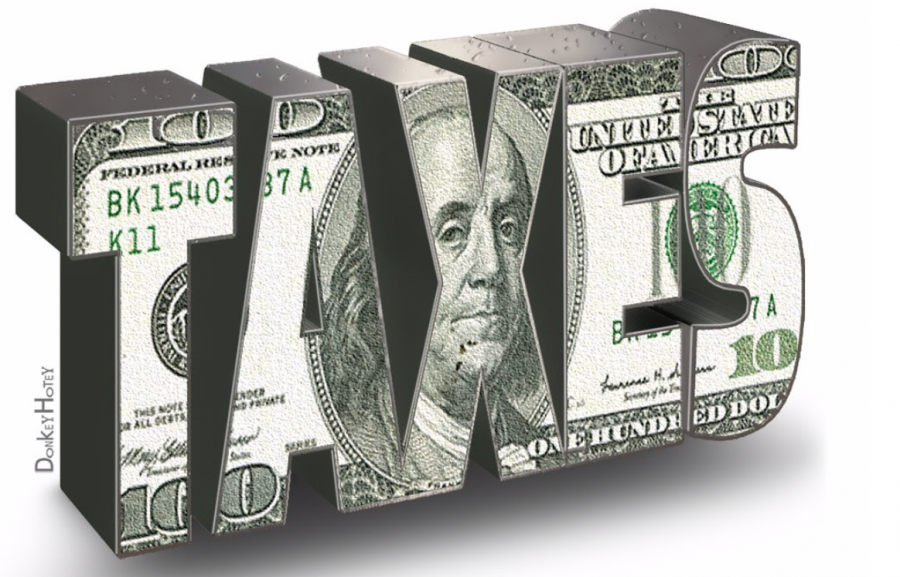Voters reject Illinois Graduated Tax Amendment
November 10, 2020
A prominent issue that was on the Illinois ballot on election day was the Illinois Graduated Tax Amendment. The bill officially passed Illinois legislation on May 31, 2019, and was then approved by Governor J.B. Pritzker on June 4, 2019. The bill was on the Nov. 2 Illinois ballot this year and did not garner enough votes. If it had been approved, it would’ve gone into effect Jan. 1, 2021.
The current Illinois tax plan is a flat tax rate. Every individual is taxed the same 4.95% on their taxable Illinois income after deductions and such, Certified Public Accountant Keith King said.
If the Illinois Graduated Tax Amendment had been voted through, Illinois would have a graduated income tax system; where the higher the income an individual makes, the higher income tax rates they would have, King said.
This isn’t the first time Illinois legislation has attempted to raise income taxes, King said.
When divided into tax tables, the new tax plan would’ve taxed those who make up to $10,000 at a rate of 4.75% of their income. However, it would’ve taxed those who make $750,000 and above at a rate of 7.99% of their income.
The key difference between this Illinois Graduated Tax Amendment and other bills is that it would have given Illinois legislation power to change the Illinois Constitution’s tax rates, King said.
“After [the bill] passes, then the legislature would have the ability to change those tax tables whenever they want,” King said. “They wouldn’t need approval from citizens.”
Another factor the Illinois Graduated Tax Amendment would have affected is the marriage penalty. This is where a couple who files joint taxes is taxed at a higher rate than if they were to file independently and thus pay more in taxes, King said.
“So [if the amendment had been passed], two people who each had $150,000 of taxable income would be in the 4.95% tax bracket, but a married couple that were in the $300,000 tax bracket would pay 7.75%,” King said.
This issue was not a problem with our current tax plan since every tax bracket paid the same rate, King said.
“I think Illinois needs more tax revenue to handle the pension liabilities they have created in the past; now people [are] retiring and wanting to be paid those,” King said. “I’m not against an increase in taxes per se, but I think to have an increase in taxes, there needs to be something that restricts spending.”
The Illinois Graduated Tax Amendment was rejected with 55% of voters ruling against it.
“I voted ‘no’ on the tax increase proposal because I didn’t feel like it was written correctly,” LaGrange Park resident Steve Storey said. “I felt like it was written like an open checkbook for the state—that they could at any time in the future raise taxes on whoever they wanted to raise taxes on whether it’s rich, poor or retired.”
The state of Illinois is in a poor budget deficit right now and is in a need for money, Storey said.
“My vote ‘no’ was not to say ‘no raising taxes’; it was just the way [Illinois legislation] proposed it,” Storey said.
Although it did not pass, 45% of voters were in favor of passing the Illinois Graduated Tax Amendment.
“I voted for the graduated income tax amendment because progressive tax structures are a very mainstream and effective tax structure that can increase revenue for the state,” Matt Hiatt ‘21 said. “Twenty-nine other states have progressive tax structures, and I think it’s time Illinois join them.”
Due to the three-month long, statewide shutdown from COVID-19, the budget deficit in Illinois has gotten worse. With more businesses shutting down, less money in circulation, and higher unemployment, the Illinois economy took a hit.
“Rejecting the ability for the state government to implement a graduated income tax structure only amplified the budget crisis,” Hiatt said. “Without more state income, spending will have to decrease to match revenue and halt the debt crisis.”





















![Movie poster for '[Rec]" (2007).](https://www.lionnewspaper.com/wp-content/uploads/2023/04/rec-640x900.jpg)



